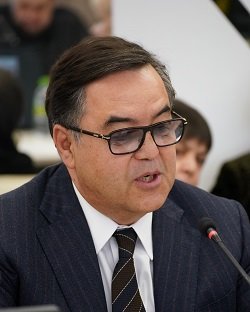How Kazan learnt from Tashkent, Bishkek, Minsk and Astana
Irada Ayupova talked with representatives of CIS film studios

It was decided to continue the 100th anniversary of Tatarkino film studio, which was celebrated last week, with an educational conference at KazanSummit. Directors of CIS film studios came to such a conclusion at a meeting of Tatarstan Culture Minister Irada Ayupova. Also, Uzbekistan and Tatarstan signed a memorandum where a joint film about Shigabutdin Marjani was announced.
Belarusians to help to make a film about Innopolis?
Indeed, the programme the experts had was rich. Besides a concert at the Tatarstan Philharmonic on 13 April, guests of the celebration participated in a round-table talk at Kazan State Culture Institute. Yury Alexey, who became director general of Belarusfilm last year, explained how his company operated in war film production. Now Ilnaz Garayev (a producer who was famous for ALQANAT band) is preparing NIK Tatarstan-Belarusian film — it will be about a young man from Innopolis.
Most of the speeches was dedicated to co-production in general. In this respect, Tatarstan has successful work experience with Kazakhstan (Tarlan) and Uzbekistan (Sumbul). The latter has a million views on YouTube, it is regularly released on TV.
By observing the audience during the celebration, one could clearly say that Tatarkino is a story about multi potential. There are some actors, they are mainly busy, let’s say, in theatres but also appear in films. There are some directors, scriptwriters, cameramen too. Distribution representatives accounted for the majority of the spectators — cinemas and mobile cinemas. They nostalgically shared information about a cinema ticket price in their youth. Though the mature age of Tatarkino is repeatedly stressed from the stage, now it is learning from younger studios.

Film on the “father of Tatarstan” underway
Uzbeks in general were the main guests during the 100th jubilee. Their films were shown at Mir cinema for three days. At a meeting after the jubilee, Director General of Uzbekkino national agency Firdaws Abdukhalikov was on the right side of Tatarstan Culture Minister Irada Ayupova. Head of Tatarkino Milyausha Aytuganova was on the left. After that, they signed a memorandum: this is designed both to help film distribution and co-organise festivals and film screening.
Work on the full-length film preliminarily named The Teacher is going on. Salavat Yuzeyev had long been dreaming about a project of a film about the life of a theologian, imam of the First Cathedral Mosque Shigabutdin Marjani, he created several documentaries. Marjani went to Samarkand and Bukhara to study at the age of 20. The film will also include a love story: the would-be author of Mustafad al'-akhbar fi Ahwali Qazan wa Bulgar falls in love with a lady and talks with her in Persian poetry.
The film production is assumed to take about three years. Ayupova reminded the audience that Marjani started writing the history of the Tatars, while inspired Abdukhalikov called him the “father of Tatarstan.”
It was immediately remembered that there are extensive Tatar burial sites in Belarus, while the topic of Aytmatov links Kazan with Bishkek. In a word, the Commonwealth of Independent States and the republic have enough topics for joint work.
“We are not given the task of making money

It is important for state-owned studios to support films that are close to the concept of high art, the director general continues. This means not only money but also education. He put an example of Ilkham film that was just screened in Kazan. President of the country Shavkat Mirziyoyev ordered to show it on all state channels on 9 March after watching it. It was a national TV premiere.
“We are not given the task of making money,” noted Abdulkhalikov, “but the task of production and release.”
This is why film caravans with directors and actors travel across the country and show films for free. Also, Uzbekkino handed over its 100 best films to television for free.

The state provides money, but how? Director of Kyrgyz Film public film centre Talantbek Tolobekov talked about it in detail: they had long been looking for a format of operation between authorities and film companies. For instance, Georgia’s experience showed that money was simply taken from the American budget. Now there is no money.
As a result, two entities are being created in Kyrgyzstan now. It is a film commission and rebate system. The latter have some nuances in different countries. For instance, film makers are sometimes sent the money back even because specific cultural heritage sites and state symbols appear in their film.
“But every country has its own legislative and mental specifics,” Tolobek reminded the audience. “And every country should consider it.”
But Uzbekistan took another road — it is creating a territory with special economic conditions, a film town with pavilions, food, a college. It will be built on a 50-hectare area in Tashkent area.
Inspired Ayupova offered to continue the conversation during the 2024 KazanForum. Her colleagues complained the Cannes Festival was due to take place during that time. But they decided they could delegate necessary specialists to Kazan if needed.